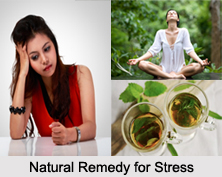 Natural Remedy for Stress involves a complete alteration in the life style of the patient.
Most people experience stress from time to time. There are many life demands that can cause stress, especially work, relationships and money problems. Traumatic life events also lead to stress. Stress is an unavoidable part of life, but there are many easy ways to deal with it. By keeping a positive outlook, making some lifestyle changes, eating a healthy diet and using some simple home remedies, one can effectively manage stress.
Natural Remedy for Stress involves a complete alteration in the life style of the patient.
Most people experience stress from time to time. There are many life demands that can cause stress, especially work, relationships and money problems. Traumatic life events also lead to stress. Stress is an unavoidable part of life, but there are many easy ways to deal with it. By keeping a positive outlook, making some lifestyle changes, eating a healthy diet and using some simple home remedies, one can effectively manage stress.
Recreation and rest are equally important and patient should set a definite time for spare time activities. They should also take a holiday at regular intervals. And above all, they should simplify their lifestyles to do away with unnecessary stress.
Diet Therapy for Stress
There are many foods which are supportive in meeting the demands of stress and should be taken on a regular basis by the patient. These are yogurt, blackstrap molasses, seeds, and sprouts. Yogurt is rich in vitamin A, B complex and D. His diet should be made of foods which, in combination, would supply all the necessary nutrients. It has been found that a diet which contains liberal quantities of (i) seeds, nuts and grains, (ii) vegetables, and (iii) fruits would give a sufficient amount of all the vital nutrients. Each of these food groups should roughly form the bulk of one of the three meals. These three basic health building foods should be supplemented with certain special foods such as milk, vegetable oils and honey. Steam cooked vegetables are best as boiling causes many vitamins and minerals to be dispelled into the water. Seeds such as alfalfa, sunflower, and pumpkin and sprouts are rich in calcium and quite of use as deterrents of listlessness and anxiety.
There are certain foods which are associated with stress and anxiety and should be scrupulously avoided by patients. These foods are caffeine and many soft drinks, which cause nervousness, irritability and palpitation.
Nutritional Supplements for Stress
Certain nutrients are beneficial in relieving stress. These are vitamins A and B, minerals such as calcium, potassium and magnesium which diminish the feeling of irritability and anxiety. Vitamin A is found in green and yellow vegetables. Some of the valuable sources of vitamin B are cashews, green leafy vegetables, yeast, sprouts and bananas. An element of vitamin B complex, pantothenic acid is in particular important in preventing stress. It has a deep consequence on the adrenal glands and the immune system and adequate amount of this vitamin along with vitamin A can help prevent many of the changes caused by stress.
 Potassium deficiencies are associated with breathlessness, fatigue, insomnia and low blood pressure. Potassium is indispensable for healthy heart muscles. Nuts and unrefined grains are good sources of potassium. Calcium is a natural sedative. Deficiencies can cause fatigue, nervousness and tension. Dairy products, eggs, almonds and soyabeans are rich sources of calcium. Magnesium is known as nature"s tranquiliser and is associated with the prevention of heart attack. Deficiencies may lead to excitability, irritability, apprehension and emotional disorders. Magnesium is also required for absorption of calcium and potassium and is found in many fruits, vegetables, seeds, dates and prunes.
Potassium deficiencies are associated with breathlessness, fatigue, insomnia and low blood pressure. Potassium is indispensable for healthy heart muscles. Nuts and unrefined grains are good sources of potassium. Calcium is a natural sedative. Deficiencies can cause fatigue, nervousness and tension. Dairy products, eggs, almonds and soyabeans are rich sources of calcium. Magnesium is known as nature"s tranquiliser and is associated with the prevention of heart attack. Deficiencies may lead to excitability, irritability, apprehension and emotional disorders. Magnesium is also required for absorption of calcium and potassium and is found in many fruits, vegetables, seeds, dates and prunes.
Home Remedies for Stress
Natural remedies are essential when treating stress and anxiety, especially when home remedies and herbal remedies can provide calming help.
1. The leaves of holy basil, known as Tulsi in the vernacular, are extremely valuable in the healing of stress.
2. Chamomile is an effective herb for reducing stress. Its calming and soothing nature has a sedative effect on the central nervous system. It helps relax the muscles, ease anxiety and promote better sleep.
3. Body massage also works as a stress reliever for many. According to traditional Chinese medicine, massage helps open blocked energy channels to reduce stress and improve overall health. A warm oil massage of the feet, hands, back and head helps relax tense muscles, improve circulation and fight anxiety.
Exercise for Stress
Regular physical exercise plays an important role in the fight against stress. Exercise not only keeps the body physically and mentally fit, it also provides amusement and mental respite. One can jog, run, walk or play games, depending upon one"s liking. Walking is the simplest and safest exercise. One should take a brisk walk for 45 minutes on a daily basis.
Yoga Asanas for Stress
Yogic asanas, Kriyas and simple Pranayamas, beneficial for safeguarding of general health and mental relaxation, can serve as the best shock absorbers against stress. These include asanas like Pavana Muktasana, Sarvangasana, Halasana, Ardha Matsyendrasana, Bhujangasana, Dhanurasana, Yogamudra, Padmasana, Trikonasana, Kriyas like Kunjal and Jalneti and Pranayamas such as Kapalbhati, Anuloma-Viloma, Sitali, Sitkari and Bhramari.
Related Articles
Naturopathy and Diseases
Stress Management
Dealing with Stress
Warning signs of Stress
Stress Reliever Massage, Aromatherapy
Aromatherapy for Natural Stress Relief
Yoga Asanas
Meditation
Exercises in Naturopathy




















